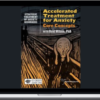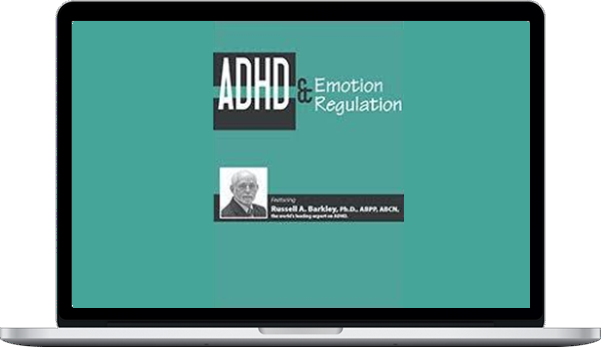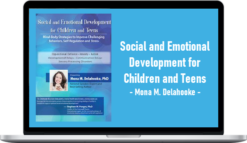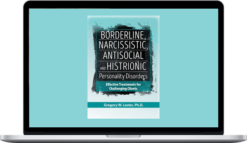Russell Barkley – ADHD & Emotion Regulation
$66.99 $9.00
»Delivery: Within 24hs
Description
Russell Barkley – ADHD & Emotion Regulation
Returning emotion to its rightful place as a core feature of ADHD serves to better explain the development of comorbid disorders, such as oppositional defiant disorder, as well as various life course impairments. Dr. Barkley will show you how to determine which aspects of emotional adjustment problems in ADHD cases are the result of the disorder, and which are likely to be the consequence of comorbidity or other life course circumstances. He will also address the implications of including emotion in ADHD for its management.
What You’ll Learn In ADHD & Emotion Regulation
Objectives
- Identify current neuropsychological theories of ADHD and the key role of emotional self-regulation problems in understanding the nature of ADHD
- Discuss the neuro-anatomy of ADHD and why those brain regions implicated in the disorder would be associated with poor emotional self-regulation
- Identify why certain comorbid disorders such as ODD are better explained by the role of emotion in ADHD than by the current DSM view of ADHD
- Explain how dysregulated emotional control in ADHD predicts the development of various life course impairments
- Describe the role of poor emotion regulation in the assessment and management of ADHD
Outline
- Current Clinical View of ADHD (excludes emotion)
- Defining Emotion and Emotional Self-Regulation
- Overview of 7 Arguments for Including Emotional Dysregulation in ADHD
- History of ADHD Includes Emotion until 1968
- Neuroanatomy of ADHD Includes Emotion Regulation Structures
- Neuropsychology of ADHD Includes Emotion Regulation Networks
- Psychological Evidence Shows Impulsive Emotion and Poor Self-Regulation in ADHD
- Emotional Dysregulation Predicts Life Risks Not Predicted by ADHD Traditional Symptoms
- Including Emotion Permits Deeper Understanding of Comorbidity in ADHD
- Implications of Emotional Dysregulation for Diagnosis of ADHD
- Implications of Emotional Dysregulation for Management of ADHD
- Related products
About Russell A. Barkley
Russell A. Barkley, PhD, recently retired (January 1, 2022) from his position as a Clinical Professor of Psychiatry at Virginia Commonwealth University School of Medicine (2016-present). He is also a retired Professor of Psychiatry and Neurology from the University of Massachusetts Medical Center (1985-2002) and subsequently worked as a Professor of Psychiatry and Health Sciences at the Medical University of South Carolina (2003-2016). Dr. Barkley is the founder and Editor of the clinical newsletter, The ADHD Report, which he continues to edit in this 30th and final year of publication (2022). He is board certified in Clinical Psychology (ABPP), Clinical Child and Adolescent Psychology, and Clinical Neuropsychology (ABCN, ABPP).
Dr. Barkley is a clinical scientist, educator and practitioner who has published 27 books, rating scales, and clinical manuals numbering more than 43 editions, and creator of 7 award winning professional videos. He has published more than 300 scientific articles and book chapters related to the nature, assessment, and treatment of ADHD and related disorders and is the author of the book Managing ADHD in School (PESI, 2016).
Dr. Barkley has presented more than 800 invited lectures in more than 30 countries and appeared on nationally televised shows such as 60 Minutes, the Today show, Good Morning America, CBS Sunday Morning, CNN, and many others. He has received numerous awards from professional societies and ADHD organizations for his lifetime achievements, contributions to research and clinical practice, and the dissemination of science.
Speaker Disclosures
Financial: Dr. Russell Barkley receives royalties as a published author. He previously received a speaking honorarium from Astra Zeneca and Takeda Pharmaceutical Company. Dr. Barkley receives royalties from ContinuingEdCourses.net and a speaking honorarium from Ochsner Medical Center and Medical College of Wisconsin. He receives a speaking honorarium, recording, and book royalties from PESI, Inc. He has no relevant financial relationships with ineligible organizations.
Non-financial: Dr. Russell Barkley is a member of the American Psychological Association, the South Carolina Psychological Association, and the American Professional Society for ADHD and Related Disorders.
More courses from the same author: Russell Barkley
Delivery Policy
When will I receive my course?
You will receive a link to download your course immediately or within 1 to 21 days. It depends on the product you buy, so please read the short description of the product carefully before making a purchase.
How is my course delivered?
We share courses through Google Drive, so once your order is complete, you'll receive an invitation to view the course in your email.
To avoid any delay in delivery, please provide a Google mail and enter your email address correctly in the Checkout Page.
In case you submit a wrong email address, please contact us to resend the course to the correct email.
How do I check status of my order?
Please log in to HealingCourse account then go to Order Page. You will find all your orders includes number, date, status and total price.
If the status is Processing: Your course is being uploaded. Please be patient and wait for us to complete your order. If your order has multiple courses and one of them has not been updated with the download link, the status of the order is also Processing.
If the status is Completed: Your course is ready for immediate download. Click "VIEW" to view details and download the course.
Where can I find my course?
Once your order is complete, a link to download the course will automatically be sent to your email.
You can also get the download link by logging into your HealingCourse account then going to Downloads Page.
Related products
Total sold: 4
Total sold: 1
Total sold: 1









